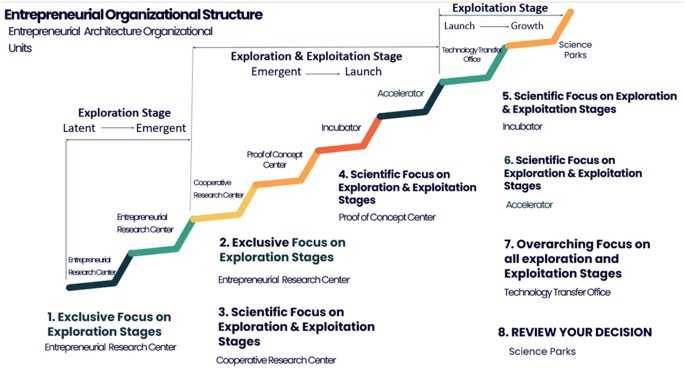Entrepreneurial universities and integrated sustainability for the knowledge-based economy: self-perception and some structural challenges in the Gulf region

Entrepreneurship promotion and generation
Teaching and learning
In analyzing the mainstreaming of entrepreneurship in teaching and learning, three main instruments emerged. Firstly, entrepreneurship is directly incorporated into the graduate profiles and teaching methods pursued by QU. The university has developed five Educational Excellence Themes and mandated that at least two of them should be implemented in all teaching courses, with a gradual rollout. These themes are as follows: Digitally Enriched, Learner-Centric; Experiential; Entrepreneurial; and Research-Informed. In order to encourage such an implementation, QU has encouraged and provided training for educators through its Center for Excellence in Teaching and Learning (CETL) on the use of methods beyond traditional lectures, such as interdisciplinary study, hands-on experience in “living labs,” guidance from experienced mentors, input lectures from experts and lecturers, and moderated debates, discussion or contests. In particular for entrepreneurial competences, the university has encouraged the use of instruments that provide direct experiences, such as games and simulations, case studies, and formal and informal encounters with entrepreneurs (Interview 4, 2022). Moreover, being “entrepreneurial” is one five graduate attributes suggested for all QU courses (alongside the attributes of competent, lifelong learner, well-rounded, and ethically and socially responsible). The “supporting competences” under the Entrepreneurial attribute are designated by the university as follows: creativity and innovation, collaborative, management, interpersonal, and leadership. Courses that decide to address this graduate attribute are screened regularly by the university curriculum committees (at department, college, and university levels) to validate their suitability to the learning outcomes of each course and the appropriateness of the indicated teaching methods (Interview 4, 2022).
Secondly, the university has established explicit programs and institutions that provide education and learning opportunities on entrepreneurship. An undergraduate program in Entrepreneurship and Innovations was established at the College of Business and Economics, while a Center for Entrepreneurship and Organizational Excellence (CEOE) was created with an executive master’s program at the same college. The CEOE should work together with CETL (as the university in-house platform for capacity-building), student organizations, and other affiliated university groups involved in entrepreneurship in order to support the mainstreaming of entrepreneurial principles into their curriculum development and classroom activities. In addition, in the Honors Program for the top 5% of QU students, enrolled students are provided with a study plan aligned with the concepts of KBE and entrepreneurship. The program has three research-based programs and six content-based modules. Out of the six content-based modules, two address the core of entrepreneurship, namely Design Thinking for Innovation and Entrepreneurship, and Launching an Innovative Business. The other four are arguably aligned with the business-driven ideas of KBE: Mastering Critical Thinking; Leadership in the Age of Disruption; Digital Technologies: Reimaging the Future; and the Fourth Industrial Revolution and Sustainable Development.
Thirdly, QU has other supporting mechanisms for increasing encounters with industry and the early involvement of students in innovative research. For example, undergraduate students are encouraged to participate in awards and grants funded by the university, e.g., the inclusion of undergraduate and graduate students in these grants as evaluation criteria. There are also several student grants provided by QU to fund innovative graduation theses. Furthermore, QU promoted research at an early stage through the National Science Promotion Program, which supports high-school students in transitioning to college by engaging them in scientific research and fostering academic excellence. Faculty members are also encouraged to include students in their grant applications with external funders, e.g., for QNRF national grants (Interview 3, 2022).
Research and development
Qatar University has included entrepreneurship in one of three Transformative Priorities (human security, education, and economic sustainability, and entrepreneurship strategies and business models) of its Social Sciences and Humanities Research Pillar (one of four main research pillars for QU). Transformative priorities are aligned with Qatar’s development policies (e.g., QNV 2030 and the second development strategy) that reflect the strengths of the university. Specifically, faculty members are encouraged to correspond to such priorities in their research and research-related teaching, such as graduation projects. Research infrastructure at QU has increased significantly; for example, there are currently 400 projects in collaboration with more than 130 countries, with over $400 million in research grants in the past decade, primarily from the Qatar National Research Fund and international collaboration co-funds (Interview 3, 2022). Some of these projects have been directed towards the entrepreneurship priority covering many critical sub-areas. QU has also recently entered into cooperation agreements with key entrepreneurship stakeholders— e.g., Qatar Development Bank, Qatar Science and Technology Park, and Qatar Business Incubation Center—with the aim of providing resources and support to entrepreneurs and startups stemming from QU students and faculty. In addition, QU bodies such as the Graduate Learning Support (GLS) play a double role of providing capacity-building activities and one-on-one consultations for student-related research as well as promoting industry-related cooperation and improving the employability or entrepreneurship skills of graduates; e.g., with the organization of competitions such as the three-minute thesis (3MT) Award (Interview 5, 2022).
Self-reorientation towards an entrepreneurial university
The goal of becoming an entrepreneurial university has been a high priority within the recent institutional transformations within QU. Entrepreneurship and innovation is an enabling strategy within QU’s own strategy for 2018–2023, which declares the aim of QU as to “promote the entrepreneurship culture and mindset in all university activities” (Qatar University Strategy, 2018–2023). Entrepreneurship and innovation strategies, as part of its transformational strategy, contribute to the achievement of the following goals: Goal 1 – higher education transformation to foster and develop an approach towards and culture of innovation and entrepreneurship in Qatar University and beyond; Goal 2—education excellence through the development of entrepreneurial skills among students, faculty, the Qatari community, and beyond; and Goal 6 – excellence in engagement to strengthen Qatar’s entrepreneurship and innovation ecosystem via collaboration with Qatar’s government, industry, and funding entities. To achieve these goals, QU has developed 58 initiatives, among which several are aimed at promoting an entrepreneurial culture and mindset among students and faculty.
Another example of the prioritization of entrepreneurship and innovation for the self-orientation of QU is the establishment of the Office of Strategic Innovation, Entrepreneurship, and Economic Development (SIEED) under the direction of the university president. SIEED was launched to initiate, manage, coordinate, and execute the development of cross-sector strategies and initiatives involving innovation and transformation, with the aim of contributing towards a holistic innovation, entrepreneurship, and economic development ecosystem across all the QU sectors and QU-owned companies and ventures. The work of SIEED should be carried out in collaboration with the countrywide entrepreneurship and innovation ecosystem. The SIEED office, working in tandem with CEOE, provides a series of consultations, pre-seed funds, and other forms of business development assistance—e.g., for startup pre-incubation, incubation, and acceleration programs – and access to external financing and funds. Moreover, the SIEED office provides advisory services for the design and implementation of innovation and entrepreneurship competencies in curricula and programs.
Outcomes and critical appraisal
Example outcomes
In this section, we present some of the example outcomes based on data provided from interviewed QU administrators responsible for the entrepreneurship efforts. Firstly, with regard to student-related research, a main outcome is the increase in students collaborating in scientific publications (e.g., from capstone projects) – although no quantification of this outcome could be retrieved. Secondly, Qatar University has been successful in creating opportunities for students to engage in entrepreneurial endeavours once they have grasped the significance of entrepreneurship and have established an entrepreneurial attitude. The university is significantly involved in providing students with exposure to a variety of problems that stimulate the development of entrepreneurial abilities; for example, by giving them real-life problems to solve, letting them communicate with actual entrepreneurs, or simply providing their training (Interview 2, 2022). In addition to incorporating their business activities within education strategies, by applying what they have learned, students are better equipped to succeed as entrepreneurs in the real world (Interview 4, 2022). Several students were supported in their entrepreneurial endeavors with some examples from the QU Business Incubator, as shown in Table 3.
Self-perception and contextual limitations
The qualitative analysis in this paper, through interviews and the analysis of QU strategies, has clearly shown the incorporation of expectations regarding entrepreneurship and their role in economic development. QU has become more aware of the entrepreneurial university model and more explicitly reflective of its contents—whether in teaching, research, or university governance. In this section, some of the identified limitations will be explained and contextualized within the academic literature on the Gulf region. They include the relative novelty of the entrepreneurship reforms in Qatar, the high expectations of the role of QU as a national university, the disparities within Qatar’s entrepreneurship system, and the long-term nature of the change towards entrepreneurship and innovation—particularly in teaching.
Firstly, there is a need for more understanding and utilization of external stakeholders in the QU entrepreneurship community. External parties – businesses, government bodies, and transfer institutions – are themselves defining their entrepreneurship policies in order to reflect their expectations regarding KBE. Cooperation among academia, industry, and government on entrepreneurship is thus still being consolidated, and so far it has focused on partnership with large companies – e.g., with government majority ownership – or with large stakeholders for supporting entrepreneurship – e.g., Qatar Development bank (Interview 1, 2022). This still-emergent industry–academia cooperation is a reflection of the novelty of the Qatari case within the entrepreneurial university sector. Similar to other GCC states, Qatar seems to have recently moved quite fast with the development of its university entrepreneurial ecosystem and the interventions adopted across the board; for example, in universities’ management and strategies, curricula, infrastructure, transfers, and stakeholder engagement (Halibas et al., 2017; Syed et al., 2023). Although the Qatari case suffers from some of the common problems in the GCC region as put forward by Hamdan and Mirza (2021), such as insufficient funding in comparison to high-income countries, we could not confirm the assertion about the lack of leadership in initiating entrepreneurship reforms (Hamdan and Mirza, 2021).
Secondly, with the political will to advance KBE and entrepreneurship, expectations are very high from national universities. As by far the biggest actor in the education system in Qatar, QU has been a main actor in implementing Qatar’s KBE ambitions, and this is reflected in the university’s reorientation towards entrepreneurship through changes to its academic offerings, research activities, and institutional strategies. These comprehensive reforms reflect the central role of QU as outlined in national visions and corresponding development strategies. In Oman, Sultan Qaboos University, as the only state university, somewhat resembles QU as regards its central role and high expectations within the national entrepreneurship ecosystem (Yarahmadi, 2019). For example, in the UAE and Kuwait, entrepreneurship reforms are distributed over several state and private universities (Yasin and Gilani, 2022). In contrast, by far the largest portion of enrolled students in Qatar are hosted at QU, particularly undergraduate students. For example, in 2019, the number of enrolled university students at the two state universities of QU and College of North Atlantic Qatar (CNL-Q) was 17,000 in comparison to only 2000 at private universities (Planning and Statistics Authority, 2019). CNL-Q (now named the Doha University for Science and Technology) reported the number its students for that period at around 3000 (College of North Atlantic, 2020), and hence QU seem to host more than 80% of students in Qatar, although no official figures are available.
Thirdly, there are important gaps in the entrepreneurial ecosystem of Qatar, with the university’s role being to advocate and help bridge these gaps in the national ecosystem. QU can disseminate ideas and practices related to KBE, innovation and entrepreneurship to the wider society and to many parts of the economic sector, which is still largely dominated by government activities (Interview 1, 2022). Qatar has made significant investments in KBE and in international research initiatives in order to commercialize the new knowledge generated (Al-Qahtani and Shirazi, 2023). However, developing the national entrepreneurial ecosystem as a part of KBE investments requires further investments that better link school education and industry-led efforts to the university entrepreneurial ecosystem. Similarly, to other experiences from the Gulf, e.g., in Saudi Arabia (Azim and Hariri, 2018), entrepreneurial education in schools is still underdeveloped. Moreover, in Qatar, the regulatory environment is seen as an important element for incentivizing entrepreneurs who have demanded more regulatory support (Komalasari, 2016). In the Gulf region, the regulatory environment is a key impediment to universities’ efforts to move towards innovation and entrepreneurship (Lee and Mirza, 2021). Institutional differences can also affect the performance of business incubators (Dahms and Kingkaew, 2016).
Fourthly, it is difficult to measure and define success, since the entrepreneurship journey is a long one, involving working through the government, market, regulations, sponsors, etc. This journey often takes entrepreneurs far from the university, nationally and internationally, and they often do not stay in contact (Interview 4, 2022). Many of the outcomes of the entrepreneurship efforts at universities are qualitative in nature rather than quantitative, such as changing the mindset of students through teaching and involvement in extracurricular activities. The university’s role is to change the mindset and culture to move students away from their traditional role of securing a job for themselves to creating jobs for others. Entrepreneurs are creative by nature and can generate opportunities for themselves and others (Interview 2, 2022). Changing the students’ mindset involves a pluralistic approach including formal and informal education, encounters with internal and external stakeholders, and the use of both types of knowledge and experience. While QU provides a platform for entrepreneurship services and opportunities, the main role of the university is to achieve an appreciation of the importance of developing entrepreneurial skills, such as those that foster innovation, professional growth, and employability, and to allow students to hone their entrepreneurship skills over time (Interview 3, 2022).
Other studies from the Gulf region also confirm that the impacts of entrepreneurship efforts by universities are hard to measure since developing a mindset of taking risks and not fearing failure is long-term impact. For example, entrepreneurs in the Gulf region have different startup methods, such as relying on family networks (Audretsch et al., 2013). Nationals prefer to work in the public sector due to high salaries, job security, and social prestige, while the students’ culture does not favor entrepreneurship due to fear of, and stigmatization in the event of, failure (Facchini et al., 2021). In the Gulf region, the university’s entrepreneurial education and the transformation of universities towards entrepreneurship have been argued to encourage entrepreneurial success and regional innovation processes (Hashimi et al., 2021; Shahwan and Zaman, 2023; Varadarajan Sowmya et al., 2010). However, promoting an entrepreneurial culture in the Gulf region is a societal task that require long-term education and a change of economic incentives (Jabeen et al., 2017; Zahrani, 2022). Universities themselves need to reflect this culture and take risks through increased collaboration with industries (Bhayani, 2015).



